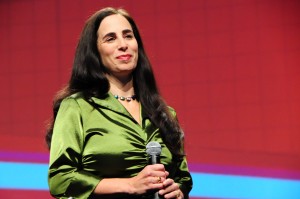Too Much to Do, Too Little Time
After the Distinguished Achievers Breakfast, APCO International Conference attendees were treated to a presentation, Overcommitted, Overwhelmed and Over It! Success Skills for the Blisteringly Busy, by Juliet Funt.
In this day and age of wireless Internet access, e-mail and smart phones, people find that they have less time and more to do. Funt, who is the daughter of Allen Funt, the creator of the Candid Camera, used humor and her favorite film clips from the show to deliver practical advice on how to manage the demands of our busy lives.
According to Funt, we all complain that we have too much to do. “We live in what I like to call the culture of insatiability, where nothing that you do is enough,” she says. “You can never be too rich or too fit … And every time you get to where you think you’re going, ‘they’ move the finish line.”
This constant pursuit of “stuff” and the addictive nature of the technology we use daily feed into the busyness of our lives and the need to achieve. According to Funt, it results in less human interaction and is not making us happier or affecting our businesses in a positive way.
The goal of her presentation was to get people to have more “white space” so they can be more calm, confident, patient and present (CCPP). “These are attributes people are starving for [in our culture],” she says.
Funt was very in touch with her audience, having studied public safety communications before coming to speak in Philadelphia. She took a moment to address the complicated nature of the job.
She said, “As I studied what you did, I got distracted because I can’t imagine being in charge of what you do. If I had to take one of those life-and-death phone calls, I would have to lay down for a week. And the fact that you do it with forced over time and evil budget restrictions, I’m so moved by you it’s hard to proceed. I want to say thank you.”
For telecommunicators and other public safety communications professionals, Funt said the attribute they instinctually possess is presence, the ability to be in the moment, to calm 9-1-1 callers and handle emergencies.
Men and women deal with the stress of our culture very differently. According to Funt, men view stress as a steady, driving external pressure that can be relieved by physical activity.
Women, on the other hand, “deal with stress like Tippi Hedren in Hichcock’s The Birds.” Women need to talk out their stress through the personal interactions that have decreased in today’s technology driven society.
White Space
“This is not the white space that has to do with bandwidth,” she says. “[It’s] a block of unscheduled time and thought that we save for the spontaneous flow of life. It can be key in terms of stress management and life balance, creativity, innovation and performance.”
To achieve more white space and ultimately CCPP, people must be willing to step back from technology. Start simply, with one or two minutes in the shower at the start of your day, experiencing the steam and being aware of your surroundings. Funt says, “This micro minute is your first taste in the day of helping your body calm and reground itself.”
Also, when you are driving in the car, let your mind wonder for at least three minutes. And if you are in between tasks, take a quick minute for a deep breath to allow your mind to adjust.
If possible take one minute to yourself 10 times a day, and then three minutes to yourself once a day. As you grow more comfortable with these pauses, you can take more time. Try to take three minutes to yourself 10 times a day, and 10 minutes to yourself once a day.
You can even schedule in your white space. Funt says, “Keep a little white space in your planner … It’s a place were emergencies are supposed to happen and it’s a place for creative thinking.”
Take time to daydream. Great minds, such as Albert Einstein, were known for daydreaming.
Business Innovation
According to Funt, the absence of white space in our lifestyles, which results in less creativity, can hurt the innovation of our organizations and businesses. For 18 years, creativity scores in our society has been steadily decreasing, while the corporate world’s value of creativity has been decreasing.
“The wondering mind is actually more vital to our successes in terms of creativity and innovation then is the reasoning mind,” says Funt.
With constant e-mailing and meetings, it’s difficult to convince the corporate world that white space is necessary. But according to Funt, the 30 minutes she puts aside for herself to unplug from technology and be in the moment with her children are her most creative moments.
“I can’t tell you how often I dash out of that room to find a pencil or a phone to jot down an idea,” she says.
The addition of white space can enable industries to address “innovation gaps.”
Funt says, “Something that never occurred to me [about your industry]. Sometimes if you are on the phone with someone in great crisis, you might never find out what happened to that person, child or home. This is an innovation gap. Someone in your industry will come up with a new technology to send a text message or something that closes that loop of knowledge so that there are not all these emotional threads left hanging for the dispatcher. These kinds of innovations do not come when we sit in a meeting. They come to us when we are walking the dog or in the shower — when we are in whitespace.”
Funt also addressed the motion that busyness results in performance and that recovery, something Olympians make time for, is not important.
The Personal Side
According to Funt, in our society, children are the most in need of white space. They need to be able to play and image in order to grow into an innovative adult. Creating whitespace for yourself when you are with your family will help you personally.
“The white space can help us slow down to really memorize [our families],” she said, “purposefully slowing our minds.”
She told the story of a woman she met in St. Louis. One day when she was younger, the woman’s father decided that the family would pack a picnic and go for a drive. But when they went to tell her mother, the mother responded with, “Sorry, I’m too busy.”
So just the woman and her father went on the drive. He died two days later. The woman’s mother spent the rest of her life talking about that drive and how she had missed it.
“In pursuit of more whitespace, I find I have more evening and weekends where I can make my life up as I go,” she says.
Disconnect
The first trick to disconnecting is asking yourself, “Can I let it go?” Not just professional tasks, but habits that interfere with our abilities to engage with our environments and people. Can you put down you iPhone or even turn it off? If you are a micromanager, can you let that task go?
For people who can’t say no, Funt suggests that they learn to say, “Can I take 24 hours and get back to you?” This statement will give those individuals breathing time to think about the situation and how they want to handle it.
If you are a control freak, something Funt openly labeled herself as, learn one simple mantra: nobody died.
According Funt, for purposes of creativity and innovation, it’s important to unplug at work. Go on the e-mail diet: “Check you e-mail at breakfast, lunch and dinner, with two snacks. … If you cannot do it every day, try to go every hour or every half hour [without checking your e-mail]. Any amount [of time] you can have purposeful moments with e-mail will get you more white space.”

From left: Martha Carter, Matt Stillwell, Juliet Funt and Ann Marie Cryer singing "I Can Let It Go."
Conclusion
“If you get people in a trance, it’s hard to break,” says Funt. “You and your busy, busy friends are in a trance. This is the day I give you permission to opt out of always feeling that your life is not enough. It’s hard to stay on point in a culture of insatiability.”
To keep the audience on track to breaking this trace, Funt ended the session on a musical note done to the tune of Joan Jett’s I love Rock n’ Roll. APCO members Martha Carter and Matt Stillwell and Ann Marie Cryer from TSC joined her on stage. Together they sang:
“I can let it go.
The pressure and the stress and the crazy rat race.
I can let it go,
So come and grab a little white space with me!”



